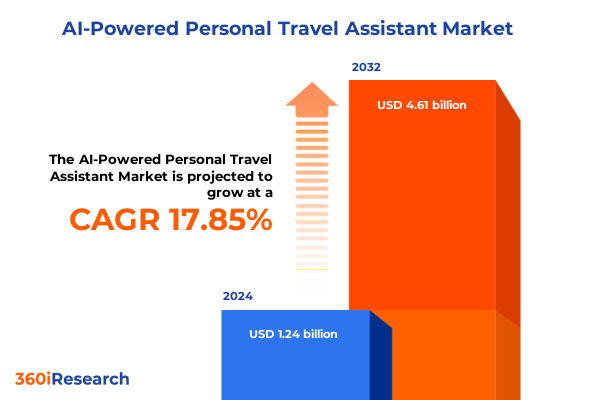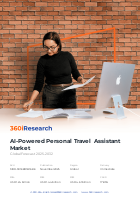The AI-Powered Personal Travel Assistant Market size was estimated at USD 1.44 billion in 2025 and expected to reach USD 1.68 billion in 2026, at a CAGR of 18.07% to reach USD 4.61 billion by 2032.

Discovering the Revolutionary Role of AI-Powered Personal Travel Assistants in Elevating End-to-End Traveler Experiences
The advent of artificial intelligence has ushered in an era of unprecedented transformation for travelers and industry stakeholders alike. What began as rudimentary chat interfaces capable of answering simple queries has evolved into sophisticated, AI-powered personal travel assistants that redefine how journeys are conceived, planned, and experienced. Across the globe, travel companies are integrating machine learning algorithms, natural language processing engines, and predictive analytics platforms into mobile and web-based applications to streamline tasks that once required human intervention. The result is an ecosystem where automated recommendations are not only accurate but also sensitive to individual preferences and contextual variables such as weather, local events, and even traveler mood.
How Generative AI and Deep Learning Innovations Are Redefining Personal Travel Assistance with Seamless Real-Time Recommendations
In recent years, the landscape of personal travel assistance has undergone transformative shifts fueled by advancements in generative artificial intelligence and multimodal interaction frameworks. Enterprise-level systems are no longer confined to handling basic itinerary queries; they now execute complex functions including rebooking disrupted trips and generating dynamic, context-aware suggestions in real time. Such capabilities are underpinned by orchestration layers that combine large language models, deep learning recommendations, and voice interface modules to deliver seamless, end-to-end service.
Examining the Aggregate Consequences of 2025 U.S. Trade Tariffs on Cross-Border Travel and Industry Revenue Dynamics
The cumulative impact of U.S. tariffs introduced in 2025 has cast a noticeable shadow over global travel flows, particularly between North America and key outbound markets. Canadian bookings to the United States plummeted by over 70% for the April through September season compared to the previous year, while European visitor arrivals fell by 17%, marking the most significant downturn since the pandemic era. This contraction in inbound traffic has reverberated through airlines, hotels, and ground transport providers, prompting operators to reassess revenue management models and adjust cost structures accordingly.
Uncovering Precise Market Segmentation Insights through Analysis of Technology, Travel Purpose, and Application Trends
Segmentation based on technology allows an in-depth study of the market as it spans conversational chatbots and virtual assistants that address traveler inquiries, sophisticated image recognition systems that facilitate location-based suggestions, and advanced machine learning and deep learning engines shaping predictive itinerary enhancements. Natural language processing modules decode and respond to nuanced traveler inputs, while predictive analytics platforms forecast demand and personalize recommendations. Speech recognition and voice assistance interfaces further empower hands-free, on-the-go interactions, seamlessly integrating multiple modalities.
This comprehensive research report categorizes the AI-Powered Personal Travel Assistant market into clearly defined segments, providing a detailed analysis of emerging trends and precise revenue forecasts to support strategic decision-making.
- Technology
- Deployment Type
- Application
- User Type
Navigating Distinct Regional Dynamics Shaping Adoption of AI-Powered Travel Assistants Across Key Global Markets
In the Americas, widespread smartphone penetration and mature digital payment ecosystems have accelerated the adoption of AI travel assistants across both leisure and business segments. Companies in North America benefit from robust data privacy frameworks that support ethical personalization while enabling advanced analytics. In Europe, Middle East & Africa, regulatory environments like GDPR necessitate stringent compliance measures, encouraging travel platforms to adopt privacy-by-design principles and secure data handling protocols. Finally, the Asia-Pacific region, characterized by mobile-first user behaviors and rapid digital infrastructure growth, serves as a fertile ground for real-time navigation assistance, localized voice services, and hyper-personalized travel planning offerings.
This comprehensive research report examines key regions that drive the evolution of the AI-Powered Personal Travel Assistant market, offering deep insights into regional trends, growth factors, and industry developments that are influencing market performance.
- Americas
- Europe, Middle East & Africa
- Asia-Pacific
Illuminating the Strategic AI Initiatives and Market Moves of Leading Travel Technology Providers
Leading industry players are making strategic moves to anchor their positions in the burgeoning AI travel assistant landscape. Booking Holdings, for instance, has intensified its AI focus through initiatives like the AI Trip Planner and the Penny assistant, leveraging its extensive inventory network to optimize room-night growth and enhance customer loyalty. Simultaneously, legacy brands are reinventing themselves: the revival of Ansett as an AI-operated travel agency in Australia exemplifies how heritage names can harness generative AI and predictive pricing engines to re-enter the market with a digital-first ethos. Other major online travel agencies and technology vendors are similarly expanding their AI portfolios, integrating deep learning recommendations and conversational interfaces to differentiate offerings and capture evolving consumer preferences.
This comprehensive research report delivers an in-depth overview of the principal market players in the AI-Powered Personal Travel Assistant market, evaluating their market share, strategic initiatives, and competitive positioning to illuminate the factors shaping the competitive landscape.
- Adam Vacations Pvt. Ltd.
- Airbnb, Inc.
- Amazon Web Services, Inc.
- Booking Holdings Inc.
- ChatGPT by OpenAI
- Copilot2trip, Inc.
- Curioso Technologies Private Limited
- CWT Global B.V.
- Eddy Travels by TripAdd LLC
- Expedia Group, Inc.
- Explorerg
- Flyfish by Fractal company
- Global Business Travel Group, Inc.
- Google LLC
- GuideGeek by Matador Ventures, Inc.
- iplanai IIC
- KAYAK Software Corporation
- Layla AI GmbH
- Live the World bv
- MakeMyTrip Limited
- Meta Platforms, Inc.
- Microsoft Corporation
- Mindtrip, Inc.
- Mondee, Inc.
- Otto Trip, Inc.
- Trip Planner AI, Inc.
- Tripadvisor LLC
- TripBot by LEON SOFTWARE SOLUTIONS PRIVATE LIMITED
- Vacay International, Inc.
- Wonderplan by Vecro Tech LTD.
Actionable Strategies for Travel Industry Stakeholders to Accelerate AI Adoption While Sustaining Compliance and Scalability
Industry leaders must invest in scalable AI architectures and establish cross-functional teams to accelerate the deployment of personal travel assistants. Embracing a modular approach to technology integration ensures that conversational engines, predictive analytics, and voice interfaces can be updated independently, reducing time to market. Partnerships with airlines, hotel chains, and mobility providers will be crucial for enriching data inputs, enhancing real-time availability insights, and improving recommendation fidelity. Additionally, embedding robust data governance frameworks will strike a balance between personalization and privacy compliance, building traveler trust and supporting global expansion.
Explaining the Rigorous Multi-Source Approach and Segmentation Framework Underpinning the Market Study
Our research methodology combined extensive secondary research with qualitative primary interviews, synthesizing insights from industry reports, corporate filings, and expert dialogues. We undertook detailed data triangulation across vendor press releases, technology white papers, and regulatory filings to validate emerging trends. A structured segmentation framework was applied to classify offerings by technology, travel purpose, and application, followed by in-depth regional analyses. Primary inputs included consultations with C-level executives, product managers, and data scientists, ensuring that findings reflect real-world challenges and strategic imperatives.
This section provides a structured overview of the report, outlining key chapters and topics covered for easy reference in our AI-Powered Personal Travel Assistant market comprehensive research report.
- Preface
- Research Methodology
- Executive Summary
- Market Overview
- Market Insights
- Cumulative Impact of United States Tariffs 2025
- Cumulative Impact of Artificial Intelligence 2025
- AI-Powered Personal Travel Assistant Market, by Technology
- AI-Powered Personal Travel Assistant Market, by Deployment Type
- AI-Powered Personal Travel Assistant Market, by Application
- AI-Powered Personal Travel Assistant Market, by User Type
- AI-Powered Personal Travel Assistant Market, by Region
- AI-Powered Personal Travel Assistant Market, by Group
- AI-Powered Personal Travel Assistant Market, by Country
- United States AI-Powered Personal Travel Assistant Market
- China AI-Powered Personal Travel Assistant Market
- Competitive Landscape
- List of Figures [Total: 16]
- List of Tables [Total: 795 ]
Drawing Together Insights on AI-Enhanced Travel Assistants to Chart the Path for Future Innovation and Growth Trends
In conclusion, the rapid maturation of AI-powered personal travel assistants presents a paradigm shift in how travel experiences are curated, managed, and optimized. Organizations that harness generative AI, leverage advanced analytics, and maintain privacy-centric data practices will gain a competitive edge in this dynamic landscape. While trade policy uncertainties and geopolitical factors may introduce headwinds, the broader trajectory of digital transformation in travel remains resilient. By adhering to the strategic recommendations outlined herein and staying attuned to evolving regional and technological nuances, industry stakeholders can embark on a path toward sustained innovation and growth.
Unlock Your Strategic Advantage by Securing the Complete AI-Powered Travel Assistant Market Research Report with Expert Support
To gain a comprehensive understanding of AI-powered personal travel assistant technologies and how they can redefine your strategic roadmap, secure your access to the full market research report today. For an in-depth briefing on detailed insights, advanced segmentation analyses, and actionable recommendations tailored to your business goals, reach out to Ketan Rohom, Associate Director of Sales & Marketing at 360iResearch. Elevate your decision-making with a complete data-driven perspective and unlock the full potential of AI in travel.

- How big is the AI-Powered Personal Travel Assistant Market?
- What is the AI-Powered Personal Travel Assistant Market growth?
- When do I get the report?
- In what format does this report get delivered to me?
- How long has 360iResearch been around?
- What if I have a question about your reports?
- Can I share this report with my team?
- Can I use your research in my presentation?




